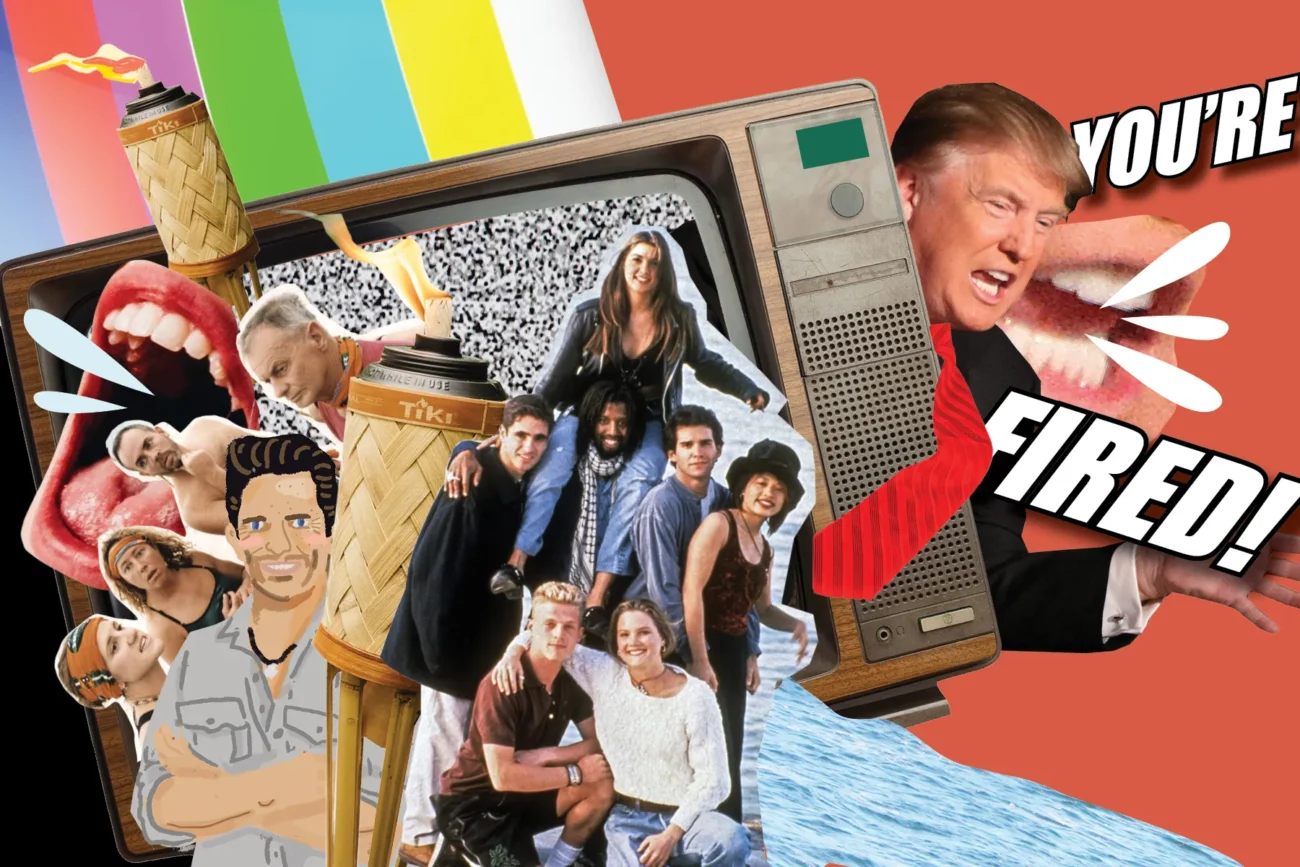
Television, that magical box that brought the world into our living rooms, has evolved tremendously since its inception. From black and white broadcasts to technicolor dreams, the content it showcased also transformed.
And then, as the 1990s approached, a new genre began to emerge: reality TV. Unlike the scripted dramas and comedies, reality TV promised something different – the allure of the unscripted, the unpredictability of real people, and the drama of real life.
The Humble Beginnings
Reality TV isn’t as new as you might think. The seeds were sown as early as the 1940s. Producer-host Allen Funt’s Candid Camera, which aired in 1948, was a pioneer. The show captured unsuspecting people in humorous and unusual situations using hidden cameras.
Fast forward to the 1990s, and we saw the rise of shows like The Real World, which would set the stage for the reality TV explosion. The concept was novel: real people, not actors, living their lives on screen. The audience was intrigued with Mike Fleiss creation, and they wanted to learn more both about the show and the creator.

Factors Contributing to the Popularity
- Authenticity: There’s something raw and genuine about watching real emotions play out. Unscripted moments, be it a tearful goodbye or a joyous reunion, resonate deeply with viewers.
- Relatability: Watching everyday people on screen, with all their imperfections and quirks, makes viewers see a bit of themselves in the participants.
- Diversity: Reality TV showcases a plethora of backgrounds, cultures, and lifestyles, offering a window into lives we might never encounter otherwise.
- Drama and Suspense: The unpredictability of real-life decisions, alliances, betrayals, and cliffhangers keeps viewers on the edge of their seats.
Pro Tip: If you’re ever on a reality show, remember the camera is always rolling. Always.
Economic Benefits for Networks and Producers
Reality TV isn’t just a hit with audiences; it’s a goldmine for networks and producers. Here’s why:
- Cost-Effective Production: Compared to scripted shows with their expensive sets, actors, and production crews, reality TV can be produced on a tighter budget.
- High Viewer Engagement: The drama and suspense ensure viewers stay glued, translating to higher advertising revenue.
- Spin-offs and Merchandise Opportunities: Successful reality shows often lead to spin-offs, merchandise, and even international versions, opening up multiple revenue streams.
Fun Fact: Some reality TV stars have turned their 15 minutes of fame into full-blown careers, launching fashion lines, writing books, and even starring in movies.

Spotlight on “The Bachelor”
We cant talk about Reality TV, without mentioning The Bachelor! I remember when it first aired in 2002.
When The Bachelo first graced our screens in 2002, it was clear that television was about to experience a romantic revolution. The show redefined dating shows and set a precedent for many that followed.
At its core, it is a journey of love. An eligible bachelor is introduced to a group of potential partners. Through dates, group activities, and the iconic rose ceremonies, he narrows down his choices, aiming to find a life partner by the season’s end.
Beyond the drama and romance, it has significantly influenced pop culture. It introduced us to rituals like the “First Impression Rose” and made phrases like “Will you accept this rose?” iconic. Its influence is evident in the numerous spin-offs and international adaptations it has spawned.
The show’s history is peppered with unforgettable moments, from surprise exits to heartwarming proposals. Each season brings its own flavor, with some bachelors leaving a more lasting impression than others.
The show’s magic lies in its blend of genuine emotions, drama, and the universal yearning for love. It’s not just about the destination but the journey, the friendships formed, and the lessons learned.
Fun Fact: Over 25 countries have their own version of “The Bachelor”. Talk about universal appeal!
Positive Impact on Society
Reality TV, especially shows have done more than just entertain. It’s made waves in society:
- Breaking Stereotypes and Promoting Diversity: Over the years, we’ve seen participants from various ethnic backgrounds, orientations, and life stories. This representation matters.
- Opening Discussions: Topics like mental health, body positivity, and personal challenges have been brought to the forefront, sparking important conversations in households worldwide.
- Inspiring Viewers: From weight loss journeys on “The Biggest Loser” to entrepreneurial dreams on “Shark Tank”, reality TV has motivated many to chase their dreams.
Pro Tip: Next time you watch, look beyond the drama. There’s often a deeper message.

Critics and Controversies
No genre is without its critics, and reality TV is no exception. Here’s what the naysayers often point out:
- Mental Health Concerns: Several participants across various shows have spoken out about the mental and emotional toll of being on such programs. For instance, after their time on the show, some contestants from “Love Island” faced significant mental health challenges, leading to tragic outcomes.
- Manipulative Editing: Reality TV often gets accused of “frankenbiting”, a technique where snippets of a participant’s words are edited together to create a sentence they didn’t say. This can be used to create a narrative or persona that might not reflect the participant’s true intentions or character.
- Exploitation of Contestants: Shows like “Big Brother” have been criticized for exploiting contestants by airing their most vulnerable moments for ratings. This includes breakdowns, fights, and intimate moments.
- Deceptive Practices: Some reality shows have been accused of not being entirely upfront with their contestants about the nature of the show. For example, “Joe Millionaire” was based on deceiving women into believing they were competing for the affections of a wealthy man, only to reveal at the end that he was not a millionaire.
Fun Fact: Some participants have come forward post-show to share behind-the-scenes secrets, shedding light on the production process.
The Future
Having watched the evolution of reality TV over the years, I’m excited about what the future holds.
- Innovations in the Genre: With advancements in technology, we might soon be watching virtual reality-based shows or even interactive episodes where viewers get to decide outcomes.
- Global Collaborations: With the world becoming a global village, we could see more international versions and collaborations, blending cultures and concepts.
- Enduring Appeal: One thing’s for sure, the allure of real-life drama, emotions, and stories is timeless. Reality TV isn’t going anywhere.
Pro Tip: Keep an eye out for new formats and concepts. The next big thing in reality TV could be just around the corner!

FAQ
How do reality TV shows select their participants?
Most have a rigorous audition process. Participants often go through multiple rounds of interviews, background checks, and sometimes, psychological evaluations.
Are reality TV show participants paid?
Yes, many participants receive compensation for their time on the show. The amount can vary widely based on the show’s popularity and the participant’s role.
How do producers ensure the safety of participants in survival-based reality shows?
While it might seem like participants are left to fend for themselves, there’s always a crew nearby. Medical teams are on standby, and safety protocols are in place.
Why do some reality TV shows have “confessionals” or “diary rooms”?
These segments allow participants to share their thoughts and feelings directly with the audience, providing insight into their strategies and emotions.
How much influence do advertisers and sponsors have on the content of reality TV shows?
Advertisers and sponsors can have a significant influence, especially on competition-based shows where prizes are awarded. However, the extent of their influence varies from show to show.
Do participants get to watch the show while it’s airing?
Typically, no. Participants usually watch the show along with the general public. This ensures genuine reactions during reunion or follow-up episodes.
Final Thoughts
Reality TV has woven itself into the very fabric of our culture. It’s not just about watching people; it’s about connecting with them, understanding their stories, and sometimes, seeing a reflection of our own lives. From the early days of hidden cameras to the polished productions of today, reality TV has given us a unique lens to view the human experience.
The beauty of reality TV lies in its adaptability. As society changes, so does the content. We’ve moved from simple game shows to complex social experiments, from talent hunts to survival challenges. And as technology advances, who knows? Maybe we’ll soon be part of the show, interacting in real-time, shaping narratives, and creating our own reality.










